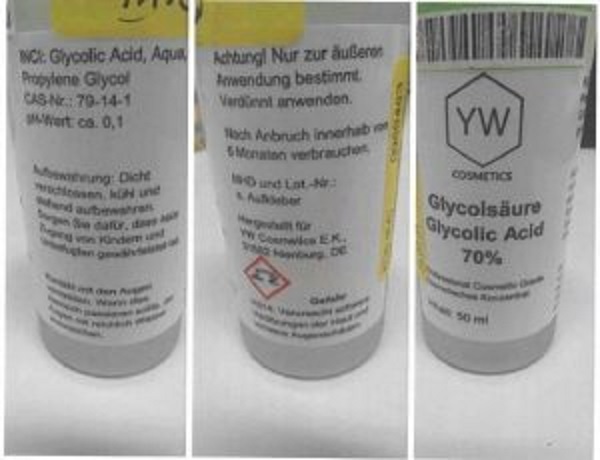Stop using YW Cosmetics, it’s dangerous to your health – NAFDAC

The National Agency for Food and Drug Administration and Control (NAFDAC) has warned the public against the use of a cosmetic product, YW Cosmetics, containing 70 per cent 70 percent Glycolic Acid.
The warning is contained in a public alert with No. 032/2022, signed by the Director-General of the agency, Prof. Moji Adeyeye, on Tuesday ìn Abuja.
Glycolic Acid is a chemical used in making skin care products. When applied to the skin, glycolic acid breaks the bonds between the outer layer of skin cells, including dead skin cells, and the next skin cell layer. This, according to experts, creates a peeling effect that can make the skin appear smoother and more even.
Adeyeye stated that the agency was equally informed of the product by German Federal Office of Consumer Protection and Food Safety (BVL).
According to her, 70 per cent of glycolic acid is a strong acidic alpha hydroxyl-acid (AHA) and is the most popular used in skin care.
She said that the product was manufactured from sugar cane, and “is the smallest AHA, and the most effective at getting into the skin”.
“’It is a substance that chemically exfoliates the skin by dissolving dead skin cells and oils.
“Products containing AHAs are marketed for a variety of purposes, such as smoothing fine lines and surface wrinkles, improving skin texture and tone, unblocking and cleansing pores, and improving skin condition in general.
“Alpha hydroxy acids can also cause mild skin irritation, redness, swelling, itching, and skin discoloration.
“Facial peels left on the skin for periods longer than recommended can cause severe burns to the skin.
“The product comes in a 50ml bottle and is traded online without a batch and lot identification number,” Adeyeye said.
According to her, NAFDAC implores consumers to exercise caution in the use of Y the cosmetics.
“Healthcare professionals, consumers and patients are encouraged to report adverse events related to the use of this product to the nearest NAFDAC office, NAFDAC PRASCOR on (20543 TOLLS FREE from all networks).
“The public is also encouraged to report adverse effects via pharmacovigilance@nafdac.gov.ng or via the NAFDAC ADR e-Reporting platform available at www.nafdac.gov.ng
(NAN)








